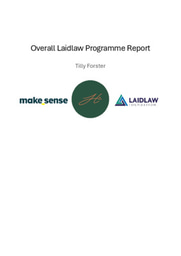Project Outline: 'Imposter Syndrome in the Classroom: What are the impacts on students' learning experiences and how can academic practice be improved?'
Imposter Syndrome in the Classroom: What are the impacts on students' learning experiences and how can academic practice be improved?
Supervised by: Dr Michelle Addison, Durham University
Project background and research question
This research project aims to explore the way in which imposter syndrome in higher education affects student experience as it is a factor which is often overlooked in widening participation schemes. Considering this, this project hopes to improve student experience regarding imposter syndrome. This project aims to shift the way in which imposter syndrome is viewed in higher education; currently, there is a stigma that this phenomenon is an individual issue, however it is important to bring to light the fact that imposter syndrome stems from structural inequalities which leads to a sense of inadequacy. Furthermore, the majority of existing research on this topic comes from a staff perspective, therefore this research project aims to concentrate on the narrative of students from Durham University, particularly those who come from a marginalised background. The key research question this project aims to address is: 'What are the impacts of imposter syndrome on students' learning experience and how can this be improved?'
Objectives
- Understand how imposter syndrome is defined
- Understand if there are specific times/places or experiences which activate experiences in imposter syndrome
- Understand how imposter syndrome impacts learning experience
- Provide insight on the impact imposter syndrome has on learning experience
Methodology
For my focus of this research project, I will be conducting a content analysis of open text responses from a pre-conducted survey regarding imposter syndrome. From this, I will then produce an infographic for student readership which raises awareness and informs about imposter syndrome.
My initial research proposal
The topic of this research project is imposter syndrome in higher education, how it impacts learning experiences and what can be done to improve this. Meadhbh Murray et al (2023) define imposter syndrome as "the experience of persistently feeling like a fraud despite one’s achievements". This issue can affect many different demographics of students and it has been identified that there is not enough intervention to aid students who suffer from this, therefore the aim of this research is to explore the impact of imposter syndrome and improve surrounding intervention. Whilst conducting further research surrounding this topic I have been inspired by Addison et al (2022) who discussed the difficulties faced by first generation scholars as they may have disadvantages accessing things such as 'cultural capital' compared to other students. Through this further reading I have found that I am particularly interested in researching the impacts of imposter syndrome on first generation scholars and contextually admitted students. I am also interested in how gender impacts experiences in higher education as Addison (2016) explores how gender impacts the workplace based on the right and wrong ways to 'do gender' at work, therefore I am interested to research whether this is mirrored in education.
So far, the academic leads of this research project have already conducted a university wide survey about imposter syndrome. Using this data, I would then conduct a content analysis of the 4 open-ended questions in the survey. I believe that it would be beneficial to then use this data to create outputs such as pamphlets and posters. This is because Meadhbh Murray et al (2023) notes how the exclusionary atmosphere of university contributes to feelings of imposter syndrome, therefore I believe it is important to create informative resources so that other students are encouraged to change their behaviour and create a more inclusive atmosphere in higher education.
I would also like to contribute some ideas of ways to conduct research as well as the aforementioned survey conducted. For example, I would like to conduct focus groups of around 6 to 8 people, with varying different demographics in different groups. I would conduct a focus group of only students who have experienced imposter syndrome, as they can share experiences with each other and create complimentary interactions, as well as mixed groups, made up of some students who have experienced imposter syndrome and some who have not, to research how behaviours and demeanours differ amongst different groups and environments. As the researcher in the focus groups, I would facilitate the research with topic guides but would ultimately have minimal interaction to allow for the flow of more valid data, with the topics discussed determined by the participants. In their journal article, Addison et al (2015) explore the impacts of accents and 'talking the talk' in higher education. This is something which I found extremely interesting in relation to imposter syndrome, therefore whilst conducting interviews I would like to pay particular attention to how students feel their accent affects how comfortable they are contributing in an academic environment.
Another research method I would like to conduct is the collaborative method of scrapbooking, inspired by Walling-Wefelmeyer (2019) who used scrapbooking methods to research female experiences of male intrusions. I find this method extremely interesting and appropriate because the research topic of imposter syndrome may be sensitive or potentially upsetting for participants to discuss, therefore giving them the opportunity to take a research question and take their own time to work through it by making a scrapbook of their ideas and experiences may be beneficial to the research, and also to the participants. I would conduct this research with different demographics of students to see how they view their academic experience and imposter syndrome from a different medium, rather than just speech or writing. This research would be conducted by finding a small sample size of students and giving them the research question for inspiration, as well as a scrapbook and materials to record their ideas. The aim of this research would be for the participants to produce data which they feel accurately portrays their feelings and emotions surrounding the topic, whether it be through writing, drawing, diary entries, etc. I would then conduct interviews with the participants once they have finished their scrapbook in which they could talk me through the output that they have made, what they have learned and ultimately their thoughts and feelings surrounding imposter syndrome in higher education.
References
Addison, M. (2016). Social Games and Identity in the Higher Education Workplace : Playing with Gender, Class and Emotion. London: Palgrave Macmillan UK.
Addison, M., Breeze, M. and Taylor, Y. (2022). The Palgrave handbook of imposter syndrome in higher education. Basingstoke: Palgrave Macmillan.
Addison, M., Victoria, & Mountford, G. (2015) 'Talking the Talk and Fitting In: Troubling the Practices of Speaking? ‘What you are Worth’ in Higher Education in the UK', Sociological Research Online, 20(2), pp. 27-39.
Meadhbh Murray, Ó., Tiffany Chiu, Y.-L., Wong, B., & Horsburgh, J. (2023) 'Deindividualising Imposter Syndrome: Imposter Work among Marginalised STEMM Undergraduates in the UK', Sociology, 57(4), pp. 749-766.
Walling-Wefelmeyer, R. (2019) ‘Scrapbooking men's intrusions: ‘It's nice to have a place where you can rant about things that people normally tell you you're over-reacting about’’, Women's Studies International Forum, 75, pp. 102242.


Please sign in
If you are a registered user on Laidlaw Scholars Network, please sign in